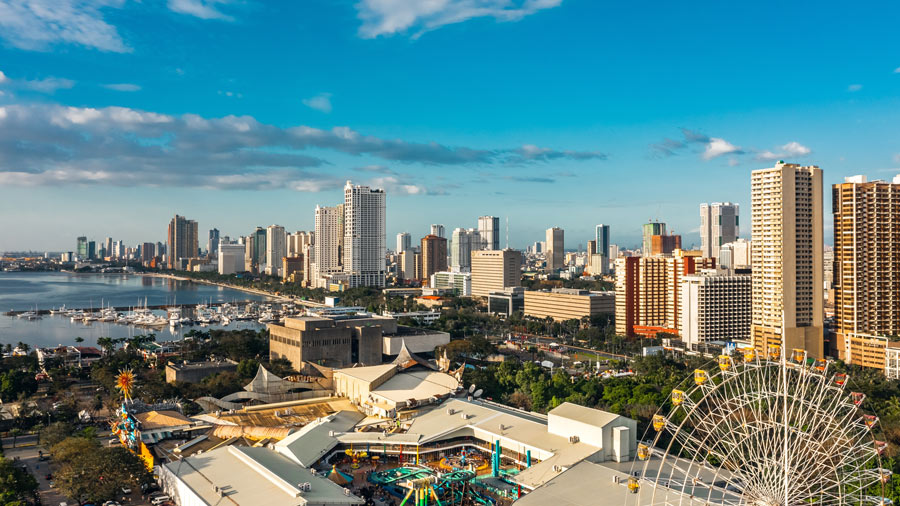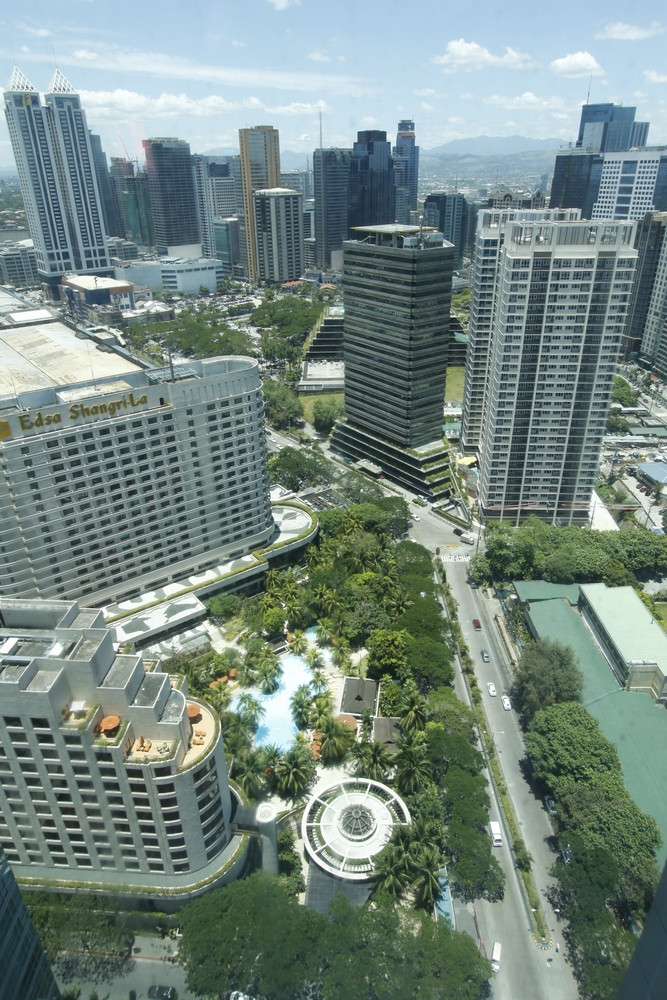
Philippines
Doing business in the Philippines offers several advantages


Growing Economy: The Philippines has experienced steady economic growth in recent years, driven by factors such as a young and skilled workforce, increasing consumer spending, and a growing middle class.
English Proficiency: English is widely spoken and understood in the Philippines, making communication easier for businesses from English-speaking countries. This can be a significant advantage for international companies.
Strategic Location: The Philippines is strategically located in Southeast Asia, making it a gateway to the larger Asia-Pacific region. This location can be advantageous for companies looking to establish a presence in the Asia-Pacific market.
BPO and Outsourcing Hub: The country has become a major hub for Business Process Outsourcing (BPO) services, including call centers, IT outsourcing, and other back-office functions. This has created a robust outsourcing industry.
Young Workforce: The Philippines has a young and growing population, which can contribute to a dynamic and energetic workforce. The availability of skilled professionals in various fields is an asset for businesses.
Government Incentives: The government of the Philippines offers various incentives to attract foreign investment, including tax breaks, duty-free importation of capital equipment, and other benefits for specific industries and economic zones.
Rich Natural Resources: The country is rich in natural resources, including minerals, agricultural products, and marine resources. This can be advantageous for businesses involved in industries such as mining, agriculture, and fisheries.
Improving Infrastructure: The government has been investing in infrastructure projects to improve transportation, communication, and other facilities. This ongoing development can positively impact business operations.
Cultural Affinity: There is often a cultural affinity between the Philippines and Western countries, which can facilitate business relationships. Filipinos are known for their hospitality and strong interpersonal skills.
Booming Tourism Industry: The Philippines is a popular tourist destination, and the tourism industry continues to grow. This can be advantageous for businesses in the hospitality, travel, and related sectors.


1 Choosing the Right Business Structure:
Foreign entrepreneurs must first determine the most suitable business structure for their venture. The options include sole proprietorship, partnership, corporation, or a branch or representative office of a foreign corporation. Each structure has its own benefits and implications on taxes, liability, and compliance requirements.
Recent developments allowed the establishment of One Person Corporation (OPC). OPC offers many advantages for small and medium enterprises (SMEs) in terms of limitations on liability and taxation benefits, among others. The benefit of limiting the business owner’s liability is not available in the case of a sole proprietorship.
Seeking advice from legal experts or consulting with the Philippine Securities and Exchange Commission (SEC) is advisable to make an informed decision.
2. Compliance with Foreign Ownership Restrictions:
Certain industries in the Philippines have foreign ownership restrictions. The Foreign Investment Negative List (FINL) enumerates these industries, and it is essential for foreign investors to be aware of the limitations and comply with the prescribed ownership caps. For some industries, a minimum level of Filipino ownership is required.
3. Meeting Capitalization Requirements:
Corporations in the Philippines are required to meet certain minimum capitalization requirements, depending on the type of business and the nature of its operations. Ensuring compliance with these capitalization rules is crucial during the incorporation process.
Minimum paid up capital is Peso 5,000. A corporation can either be stock or non-stock company regardless of nationality. Such company, if 60% Filipino – 40% foreign-owned is considered a Filipino corporation; if more than 40% foreign-owned, it is considered a domestic foreign-owned corporation.
4. Business Registration and Licensing:
Registering the business with the appropriate government agencies is a critical step. The process typically involves securing a business name, obtaining a Tax Identification Number (TIN), and registering with the SEC or Department of Trade and Industry (DTI) for sole proprietorships. Additionally, businesses must secure permits and licenses specific to their industry and location.
5. Hiring and Labor Laws:
Foreign entrepreneurs must familiarize themselves with the country’s labor laws and regulations. The Philippines has labor standards governing wages, working hours, benefits, and employee rights, which must be adhered to when hiring local employees.
6. Taxation and Fiscal Incentives:
Understanding the Philippine tax system is essential for foreign businesses. Compliance with local tax laws, including income tax, value-added tax (VAT), and other levies, is vital. Additionally, businesses may explore fiscal incentives offered by various investment promotion agencies to encourage investment in certain sectors or regions.
7. Intellectual Property Rights:
Protecting intellectual property rights is crucial for foreign businesses. Entrepreneurs should register trademarks, patents, and copyrights with the Intellectual Property Office of the Philippines (IPOPHL) to safeguard their innovations and brand assets.
8. Permits and Environmental Compliance:
Certain businesses may require environmental compliance certificates and permits, particularly those engaged in activities with potential environmental impact. Ensuring compliance with environmental laws is essential to avoid legal complications.
-
TYPES OF BUSINESSES IN THE PHILIPPINES
- Sole Proprietorship
Sole Proprietorship is a business structure owned by an individual who has full control/authority of its business and owns all the assets, personally owes answers to all liabilities or suffers all losses but enjoys all the profits to the exclusion of others. A sole proprietorship must apply for a business name and be registered with the Department of Trade and Industry (DTI).
- Partnership
Under the Civil Code of the Philippines, a partnership is treated as juridical person, having a separate legal personality from that of its members. Partnerships may either be general partnerships, where the partners have unlimited liability for the debts and obligation of the partnership, or limited partnerships, where one or more general partners have unlimited liability and the limited partners have liability only up to the amount of their capital contributions. It consists of two or more partners. A partnership with more than Peso 3,000 capital must register with the Securities and Exchange Commission (SEC).
- Corporation
Corporation is composed of juridical persons established under the Revised Corporation Code of the Philippines (RA 11232) and regulated by the SEC with a personality separate and distinct from that of its stockholders. The liability of the shareholders of a corporation is limited to the amount of their share capital. It consists of at least five to 15 incorporators, each of whom must hold at least one share and must be registered with the SEC.
CORPORATE NAME
Per SEC Memorandum Circular No 13 Series 2019, the words which should or may be added to the corporate name when forming the same, such as:
- If a corporation, the corporate name must contain either of the following words: “Corporation,” “Incorporated,” “Corp.,” or “Inc.”;
- If a One Person Corporation, the corporate name must contain the word “OPC” either below or at the end of its corporate name;
- If a partnership, the partnership name must contain the word “Company” or “Co.”;
- If a limited partnership, the partnership name must contain the word “Limited” or “Ltd.”;
- If a professional partnership, the partnership name may bear either of the following words: “Company,” “Associates,” or “Partners,” or other similar descriptions;
- If a foundation, the corporate name must use the word “Foundation”;
- If a non-stock, non-profit corporation, including non-governmental organizations and foundations engaged in microfinance activities, the corporate name must use the word “Microfinance” or “Microfinancing”; provided, that said corporations shall state in the purpose clause of their Articles of Incorporation that they shall conduct microfinance operations pursuant to Republic Act No. 8425 or the Social Reform and Poverty Alleviation Act;
- If an entity engaged in the financing or investment house business, the corporate name can contain the following words: “Finance Company,” “Financing Company,” “Finance and Leasing Company,” and “Leasing Company,” “Investment Company,” “Investment House”;
- If a lending company, the corporate name can contain either “Lending Company” or “Lending Investor;
- If an entity authorized to operate pawnshop, the corporate name can make use of “Pawnshop”;
- If an entity engaged in the banking or trust business, the corporate name can bear any of the following words: “Bank,” “Banking,” “Banker,” “Savings and Loan Association”, “Trust Corporation,” “Trust Company” or words of similar meaning;
- If the United Nations and its attached agencies, the words which can be used are “United Nations”, or “UN”;
- If entity with licensed warehouse, the corporate name can bear the word “Bonded”;
- If corporations authorized to act as special purpose vehicle, the corporate name can make use of “SPV-AMC”;
- The name of an international governmental organization, such as “International Criminal Police Organization” (INTERPOL), “International Monetary Fund” (IMF), and “International Labour Organization” (ILO) may not be used as part of a corporate or partnership name unless when duly authorized or allowed by the Commission”; and,
- ASEAN (protected under Article 6ter of the Paris Convention for the Protection of Industrial Property, adopted in 1883 and revised in Stockholm in 1976)
-
TAX OBLIGATIONS
Overview
At the national level, taxes are imposed and collected pursuant to the National Internal Revenue Code, the Tariff and Customs Code, and several special laws. There are four main types of national internal revenue taxes: income, indirect (value-added and percentage taxes), excise and documentary stamp taxes, all of which are administered by the Bureau of Internal Revenue (BIR). At the local level, governments have some autonomy to impose taxes on business and ownership of real property.
There is a territorial system of taxation for foreign corporations and individuals, as well as non-resident citizens. Only Philippine-sourced income is subject to Philippine taxes for the latter group.
Corporations incorporated under Philippine laws and resident citizens are subject to income tax on their worldwide income.
Tax Identification Number (TIN) is issued to individual (real or juridical) for all commercial activities.
- Taxable period
The accounting period must follow a 12-month fiscal period but may or may not follow the calendar year. Most Philippine companies have a fiscal year that ends in December or March.
- Tax returns
Corporations should file their returns and compute their income on the basis of an accounting period of 12 months.
Corporate taxpayers file self-assessed returns. Electronic filing and payment of taxes are available under the Electronic Filing and Payment System (eFPS) of the BIR.
Taxpayers who are required to file their returns using eFPS or eBIRForms but fail to do so shall be subject to a penalty of PHP 1,000 per return and civil penalties equivalent to 25% of the tax due.
A domestic or resident foreign corporation is required to file cumulative income tax returns on a quarterly basis. Within 60 days from the close of each of the first three quarters of its taxable year, the corporation must file a return summarising its gross income and deductions for the year to date. A final annual income tax return must be filed on or before the 15th day of the fourth month following the close of the taxable year.
Corporate taxpayers must file their income tax returns using one of three different forms, depending on their tax regime (i.e. subject only to the regular income tax, tax exempt, or with mixed income subject to multiple tax rates or special/preferential rates).
- Payment of tax
The Philippines follows a pay-as-you-file system for income tax, so the quarterly and annual income tax payments would fall due on the same filing deadlines discussed above. The balance of the tax due after deducting the quarterly payments must be paid, while the excess may be claimed as a refund or tax credit.
- Annual statutory audit
An annual statutory audit is required for all corporations with authorised capital stock or paid-up capital exceeding PHP 50,000, including branches of foreign corporations. It is also required for any corporation whose gross annual sales or earnings exceed PHP 3,000,000.
- Applicable Taxes
Resident Foreign Corporations, including a branch, are subject to the following Philippine taxes:
- Regular Corporate Income Tax (RCIT) at the rate of 25% based on the net taxable income derived during each taxable year from all sources within the Philippines, or Minimum Corporate Income Tax (MCIT) at the rate of 2% based on the gross income derived during each taxable year, beginning on the 4th taxable year, from all sources within the Philippines, whichever is higher;
- Value-Added Tax (VAT) at the rate of 12% of the gross selling price for the sale of goods or properties or 12% of the gross receipts for the sale of services, whichever is applicable;
- Other Percentage Taxes of 3% for non-VAT registered businesses
- Branch Profit Remittance Tax at the rate of 15% of total profits applied or earmarked for remittance;
- Withholding Tax on Compensation at varying rates depending on the taxable income of the employees;
- Expanded Withholding Tax (EWT) on certain expenses provided under Revenue Regulation No 02-98, as amended;
- Final Withholding Tax (FWT) at varying rates depending on the type of passive income such as dividends, interest, royalties and technical fees;
- Capital Gains Tax of 6% for sales of properties;
- Excise Tax for importation and usage of specific goods and services;
- Fringe Benefit Tax for non-monetary employee benefits; and
- Local Taxes imposed by the Local Government Units (LGU).
Non-Resident Foreign Corporations are subject to the following Philippine taxes:
- RCIT at the rate of 25% based on the gross income derived during each taxable year from all sources within the Philippines;
- VAT at the rate of 12% of the gross selling price for the sale of goods or properties or 12% of the gross receipts for the sale of services, whichever is applicable; and
- FWT at varying rates depending on the type of passive income.
- Tax Incentives
BOI incentives
The following incentives are available to businesses who register with the BOI under the 1987 Omnibus Investments Code (Executive Order or EO 226), subject to specific requirements and conditions:
Fiscal incentives
Six-year income tax holiday (ITH) for pioneer enterprises and four years for non-pioneer firms. If a non-pioneer organisation is located in a less developed area, it is entitled to six years of ITH. Businesses situated in Metro Manila will not be granted ITH unless they are:
- Within a government industrial estate
- Service-type companies with no manufacturing facilities
- Power generating plants; or
- Exporters with expansion projects
- Tax credited on supplies, raw materials, and semi-manufactured products
- Additional deduction from taxable income for the labour expense
- Additional deduction from taxable income for necessary and major infrastructure works
Non-fiscal incentives
Some non-fiscal incentives are also available to registered businesses, including:
- foreign national employment
- Guaranteed repatriation of foreign investments and earnings
- Consigned equipment importation for an unlimited period subject to the posting of a reexport bond
PEZA incentives
The PEZA is responsible for operating, administering, managing, and developing Special Economic Zones or eco zones under the Special Economic Zone Act of 1995.
The above-mentioned ITH incentives will be available to businesses operating in eco zones. PEZA-registered exporters are also excluded from paying taxes and duties on capital equipment, raw materials, and other products directly related to their registered business.
Furthermore, PEZA-registered organisations will be liable to a final tax at a preferential rate of 5% of their gross income generated instead of all other local and national taxes.
-
CORPORATE GOVERNANCE
Under the Revised Corporation Code, corporation must formally organize and elect below mandatory public officers:
- President, who must be a director
- Treasurer, who must be a resident
- Secretary, who must be a citizen and resident of the Philippines
- Such other officers as may be provided in the by-laws. The board shall elect a compliance officer if the corporation is vested with the public interest.
Documents and information required:
- Members and directors identity documents (passport for a physical person, business profile in case of legal person)
- Indication of Share capital, subscribed and paid up
- Members and directors proof of address
- Proposed company name
- Registered office and related documents
- Apostilled Special Power of Atty to apply for TIN
- Articles of Incorporation
- By-Laws
- Treasurer’s Affidavit
- Joint Affidavit of Undertaking
- Bank Certificate (not required on a case to case basis)
- Board Resolution for Authorized Philippine Representative of Corporate Entity if it will be an Incorporator and Stockholder
- Apostilled Articles of Incorporation and By-Laws for the Incorporator who signs outside Philippines
-
TAX MANAGEMENT
The incomes of individuals can be divided into the following categories:
- Compensation income is the income that comes from an employer-employee relationship. Salaries, wages, emoluments, and honoraria, commissions, taxable bonuses, and fringe benefits all fall into this category.
- Business income and income from profession consist of business and/or trade income, fees from the exercise of profession, gains from the sale or exchange of assets, commissions, rental income, and other incomes not covered by compensation income.
- Passive income and other sources of income such as interest from foreign or Philippine currency bank deposits, royalties, prizes and other winnings, and dividends. Capital gains from the sales of shares of stock, sales of rental property, and informer’s rewards are also included here.
- Citizens of the Philippines whose incomes are derived from sources both within and without the Philippines are subject to tax. Aliens are taxed similarly as resident citizens, but only from sources within the Philippines.
Who are required to file Income Tax Return?
- A Filipino citizen living in the Philippines, receiving income from sources within or outside the Philippines, and if you are:
- Employed by two or more employers, any time during the taxable year.
- Self-employed, either through the conduct of a trade or professional practice.
- Deriving mixed income. This means you have been an employee and a self-employed individual during the taxable year.
- Someone who derives other non-business, non-professional related income in addition to compensation income not otherwise subject to a final tax.
- Married, employed by a single employer, and your income has been correctly withheld—the tax due is equal to the tax withheld—but your spouse is not entitled to a substituted filing.
- Marginal income earner.
- Someone whose income tax during the past calendar year was not withheld correctly—if the tax due is not equal to the tax withheld.
- A non-resident citizen i.e if you are a Filipino who works or resides abroad, receiving income from sources within the Philippines. You are taxable only for the income you earn from the Philippines.)
- A Non-Filipino citizen but you receive income from sources within the Philippines, regardless of your residency. (You are taxable only for the income you earn from the Philippines.)
- Domestic corporations and partnerships receiving income from sources within and outside the Philippines. This also includes foreign corporations and partnerships receiving income from sources within the Philippines.
- Estates and trusts engaged in trade or business are also required to file their ITR.
Who is exempt from filing income taxes?
- A minimum wage earner,
- Someone whose gross income (total earned for the past year) does not exceed your total personal and additional exemptions,
- Someone whose income derived from a single employer does not exceed P60,000 and the income tax on which has been correctly withheld.
- Someone whose income has been subjected to final withholding tax.
- Qualified for substituted filing.
- A non-resident citizen who is:
- A Filipino citizen not residing in the Philippines, but who has established with the BIR that you wish to remain living outside the country.
- A Filipino citizen who leaves the Philippines during the taxable year to reside abroad, either as an immigrant or for permanent employment.
- A Filipino citizen who works and earns income abroad.
- A Filipino citizen previously considered a non-resident citizen.
- An overseas Filipino worker whose income is derived solely from sources outside the Philippines.
Required Information to File Income Tax Return
- Tax Identification Number (TIN)
- Income Statement
- A summary of any interest you’ve earned on your bank accounts.
- Information related to your investment income, such as shares, dividends and managed funds.
- Receipts for charity donations
- Receipts for work-related expenses
- Certificate of Withholding Taxes (CWT, EWT, FWT)
- Previous tax returns, if applicable
-
HR AND PAYROLL
How is Payroll Calculated in the Philippines?
The Philippines payroll requirements mandate registering the company with appropriate government agencies. You must decide on a payroll process and learn about the statutory deductions for calculating your employees’ salaries.
The standard payroll deductions in the Philippines are
- Employee Income tax, if applicable
- Social Security System,
- Philippine Health Insurance Corporation (PhilHealth), and
- Home Development Mutual Fund (Pag-IBIG)
Important Elements of Salary Structure in The Philippines
Companies must know the essential components of a salary structure per the payroll policies and procedures in the Philippines. Also, it is essential to remember that standard allowances are rare in the Philippines. However, some organizations must provide special remuneration for housing, transport, medicine, and childcare.
The important elements of payroll in the Philippines are:
- Minimum wage:There is no fixed minimum wage requirement in the Philippines – it varies across the country. A tripartite regional wage board decides the minimum wages depending on the region, size, and industry.
- Cost of living allowance (COLA): This is a mandatory benefit covering all minimum wage-earning employees in Region III regardless of their position or status of employment. The COLA is set at P20 per day.
- 13th Month Pay: This is a mandatory benefit given to employees equivalent to the 1 month salary usually given before the year ends
- Employee Income Tax: Income tax under graduated rates to be withheld and remitted to BIR
- Overtime: Every employee in the private sector – except domestic workers and workers paid by results – is entitled to overtime for working beyond eight hours a day.
-
- The overtime rate is 25% of the hourly rate on a regular workday
- The overtime rate is 30% of the hourly rate for working on a holiday
- Holiday pay: The Philippine Labor Code mandates holiday pay to compensate employees working on a holiday. An employee working on a regular holiday gets compensated with 200% of their salary for that day. There are 18 public holidays in the Philippines.
- Social security system (SSS): This is a government-mandated program offering several benefits to private-sector employees for sickness, disability, or maternity purposes. It acts as a state-run pension fund for lifetime SSS members. Employers and employees both pay a share in employee SSS contributions.
- The Schedule of Contribution rates differs according to the pay scale. The revised SSS contributions are 12% of the monthly salary for a maximum salary of P20,000. It is divided into –
-
-
- Employer share: 8%
- Employee share: 4%
-
- Philippine health insurance corporation:Commonly known as PhilHealth, this affordable health insurance covers all employees. 3% of the employee’s monthly salary (1.75% by employer and employee each) is contributed towards PhilHealth.
- Home development mutual fund (Pag-IBIG): This is a national fund with home loan provisions for affordable housing for employees in the Philippines. The contribution rates depend on the salary. The monthly contribution is capped at P100 each for the employer and the employee –
-
- Employer share: 2%
- Employee share: 2% (if gross monthly salary is more than P1,500).
-
ACCOUNTING
Culminating a process of convergence initiated in 1996, financial reporting standards in the Philippines have achieved full compliance with current effective Full IFRS and IFRS for SMEs.
Accounting Standards in the Philippines are codified in the set of standards called Full Philippine Financial Reporting Standards (PFRS) and PFRS for SMEs.
Businesses are required to maintain proper records and complete set of books of accounts and must prepare their financial statements based on effective PFRS and PFRS for SMEs as required by several regulatory agencies such as SEC, IC, BSP and BIR.

